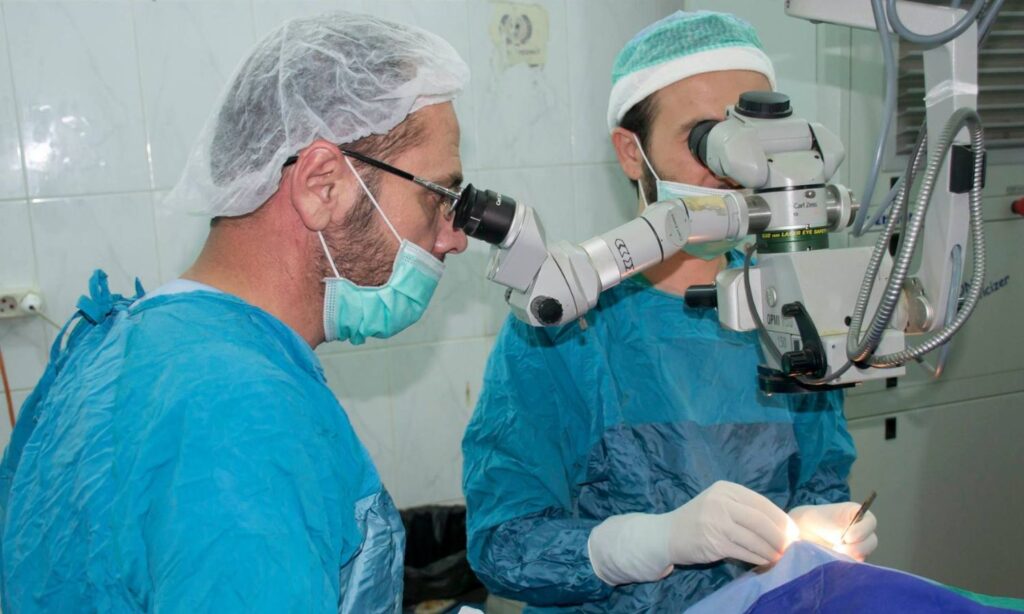The administration of Bab al-Hawa Hospital in Idlib, northwestern Syria, announced that it faces the challenge of confirmed funding cessation by the end of this September, threatening the continuity of vital services for more than 1.7 million people, both internally displaced persons and residents of surrounding camps.
The statement, issued on September 4 by the hospital administration, pointed to the successive crises faced by northwestern Syria, which have threatened the continuity of the hospital’s operations (a specialized surgical center in Sarmada), one of the most important medical centers in the region.
The statement explained that the hospital administration, in cooperation with the main supporter, the Syrian American Medical Society (SAMS), is making efforts to ensure the uninterrupted continuation of medical services. These efforts revolve around addressing the severe funding shortage that threatens to shut down medical services entirely.
The statement also said, “We fully recognize the anticipated impact of closing the hospital or stopping its services, and we are working hard to explore all possible ways to create new funding opportunities and maintain these essential services.”
It continued, “Our staff has bravely and courageously resisted security conditions, war repercussions, and targeting of health and medical personnel, working in harsh and dangerous conditions in northwestern Syria. But today, war is not the only factor threatening operations.”
The hospital administration pledged to the residents of northwestern Syria to exert efforts to maintain the continuity of medical services and to try to ensure that people’s access to their rights to dignified health and medical care is not affected.
Funding reduction
Bab al-Hawa Hospital was established over 11 years ago and has remained the final referral point for advanced medical services in the region. It has provided primary and secondary health care services, specialized surgeries, oncology treatments, and emergency services, including those for victims of military attacks and other incidents and injuries that the region’s residents are exposed to, making it a mainstay in the area’s health system, according to a statement posted on the hospital’s Facebook page.
Dr. Mazen Kewara, director of the Turkey and Northern Syria Office for the Syrian American Medical Society (SAMS), told Enab Baladi that Bab al-Hawa Hospital is funded by a grant from the US Office of Humanitarian Assistance since SAMS took over funding the hospital in 2018.
Kewara pointed to a significant reduction in funding and the inability to continue funding the hospital, as it is a large and central medical facility that requires hundreds of thousands of dollars annually to operate.
Since being notified by the donor six months ago regarding the funding reduction, the association has been searching for solutions and other funding sources, but efforts have not yet been successful.
SAMS has also informed the hospital administration of the situation, while the search for solutions continues in cooperation with the Idlib Health Directorate and hospital administration to support the continuation of some essential departments within the hospital for which there are no alternatives in northwestern Syria hospitals.
However, solutions are still under exploration and have not yet been found, according to Kewara.
The medical sector in northern Syria suffers from a lack of equipment and personnel, especially due to the reduction of support and the closure of many hospitals and medical centers, which has increased patients’ suffering in affording treatment costs in private hospitals.
Many health facilities are forced to reduce their operations, close departments, or reduce working hours due to lack of funding. Over 110 health facilities, including 34 hospitals, have already ceased operations as of the end of last July.
If the funding shortage continues, it is feared that 50% of all operating health facilities in northwestern Syria will stop operating entirely or partially by December 2024, according to a report by the UN Office for the Coordination of Humanitarian Affairs (OCHA) issued last August.
At the same time, OCHA reiterated that health services are facing reductions due to lack of funding, as half of the health facilities in northwestern Syria are at risk of closure by the end of the year.

